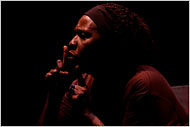The 14 short plays that make up “The River Crosses Rivers” are all by women — mostly black, with a smattering of South Asians — but there’s no shortage of diversity. The plays address an admirably broad range of experience — politics and war; family, love and loss; abortion, punk rock and dating — in a broad range of voices.

Elain Graham in Lynn Nottage’s “Banana Beer Bath,” part of “The River Crosses Rivers” series.
“The River Crosses Rivers” is presented in two series over two evenings by the Ensemble Studio Theater, a longtime incubator of theatrical talent. Some of the writers are well known (Lynn Nottage, Kia Corthron, Ruby Dee) and others less familiar.
One theme crops up again and again: the struggle between parents and children. In Ms. Dee’s “Step-Mother,” a young career woman tries to find the patience to deal with her difficult stepmother (Carmen de Lavallade). Ms. de Lavallade gives such bitter shadings to the word love — often followed by “as you call it” — that it becomes clear what her stepdaughter is up against. (“River” also frequently reminds you of the deep pool of acting talent New York playwrights can draw on.)
In J. E. Franklin’s comedy “Hot Methuselah,” a mother (Vinie Burrows) declares her independence from her philandering husband and her son’s circumspection. Ms. Burrows, who relishes her character’s occasional slips of decorum, is so entertaining that it hardly matters if Ms. Franklin’s play stops cold, rather than finding an ending.
Both programs have peaks and valleys. Many of the pieces feel more like sketches than worked-out pieces. A few clunk along too familiarly and a few seem like jokes with obscure punch lines.
Unsurprisingly, the strongest work is by Ms. Nottage, who won the 2009 Pulitzer Prize for her play “Ruined.” Her piece here, “Banana Beer Bath,” creates drama out of the simplest tools: a woman, seated on a chair, telling a story. That story, inspired by one Ms. Nottage heard in Uganda, concerns three sisters — “the beauties” — who, when rebels invade their home, hide in vats of their father’s banana beer.
The cruelties have been recounted “time and time again,” the woman (a wonderful Elain Graham) says. She won’t repeat them. “Instead, here’s what I remember, the snapping of twigs that announced their arrival after sundown.” And more.
Ms. Nottage uses language with the confidence of a storyteller enthralling listeners around a campfire. The details are visceral, the words poetic but not writerly, the effect intimate. When Ms. Graham finished, a man behind me shouted, “Wow!”
Ms. Nottage’s play comes second to last on the Series A program. At first it seems cruel to make another work follow it, but Bridgette Wimberly’s “Rally” manages to be moving in a wholly different key.
It’s 2008. A grandmother (Venida Evans) and her granddaughter (Erin Weems) set up folding chairs in a parking lot, waiting for a speaker who is never named but can be only Barack Obama. The grandmother, who has lived through the civil rights era, wonders if times really have changed, and if her granddaughter’s generation really is colorblind.
Ms. Evans and Ms. Weems have an easy rapport and make their characters something more than generational emblems. They argue as they wait in the hot sun. But when the speaker arrives, they present a united front. Together they yell, “Change, change, change, change!”



 (4.5 stars, 4 votes)
(4.5 stars, 4 votes)